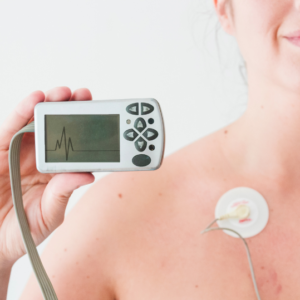- +91 83103 67685
- info@drameetoswal.com
- Basavanagudi
Holter Monitor Test in Bangalore is portable ECG that monitors your heart’s electrical activity while you are away from the doctor. Because there are some details a resting ECG may miss out!

Holter Monitor Test in Bangalore | It is a portable ECG that monitors your heart’s electrical activity while you are away from the doctor. It is a device that is secured around the waist and has sticky electrode patches that are to be put on your upper body area. It continuously records your heart’s natural electrical impulses which govern the contractions in the different parts of it.

Sometimes it is possible that a resting ECG does not give clear enough readings. There are also some arrhythmias that only occur once in a while. A Holter monitor is an attempt to get a better view of your heart’s current situation. Your cardiologist may suggest a Holter monitor if you have any of the following symptoms :
Some reasons for your cardiologist might request a Holter monitor include:
A Holter monitor monitoring is a small process. It may vary depending on your specific condition but in the majority of cases, a Holter monitor recording follows this process:
These are some of the things that should be avoided while wearing the Holter monitor. Here is a list of things that may interfere with or alter readings :
The Holter monitor is a non-invasive way of evaluating your heart’s condition. No current is passed through the body at any point in time. So it is a harmless and easy procedure.
In the majority of cases, the Holter has a 24 Hr operational guideline but the time may be extended to 72 Hrs depending on your cardiologist’s judgement.
Subscribe our newsletter for latest information in the field of cardiology
WhatsApp us